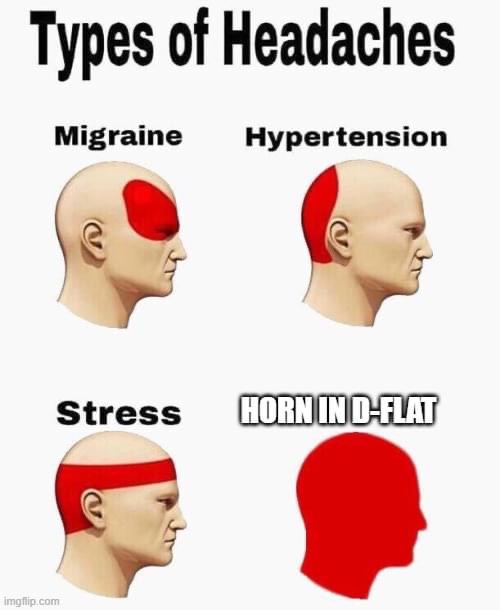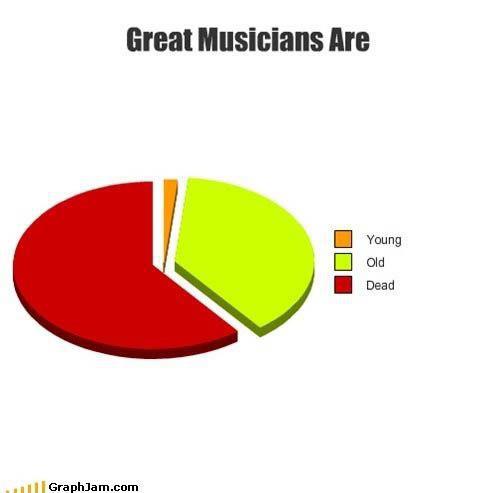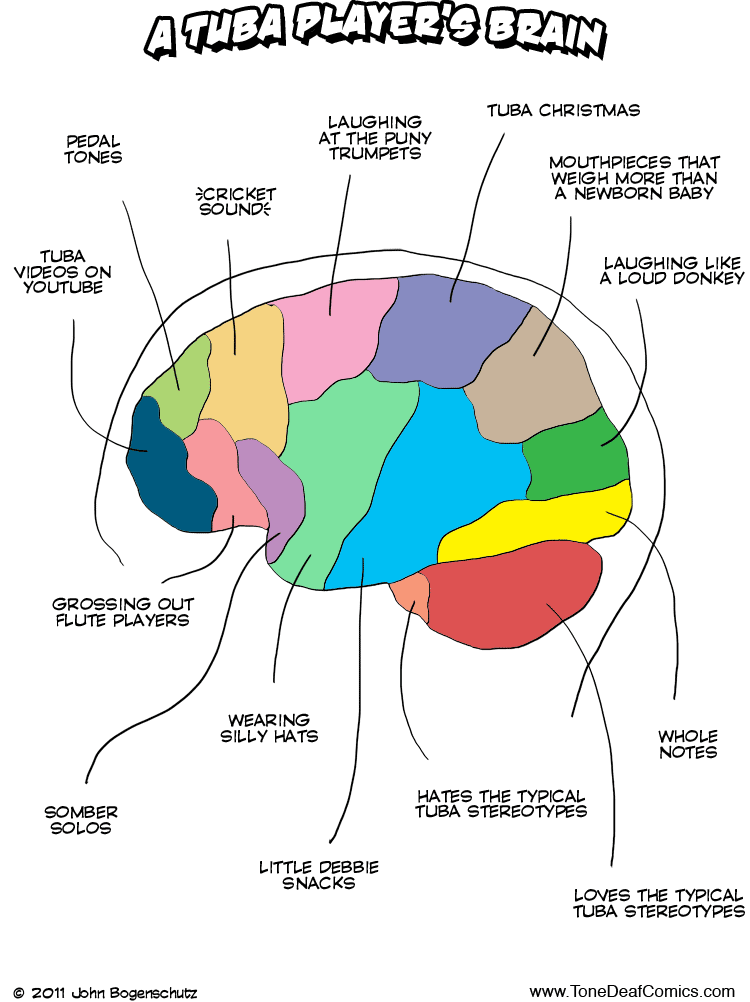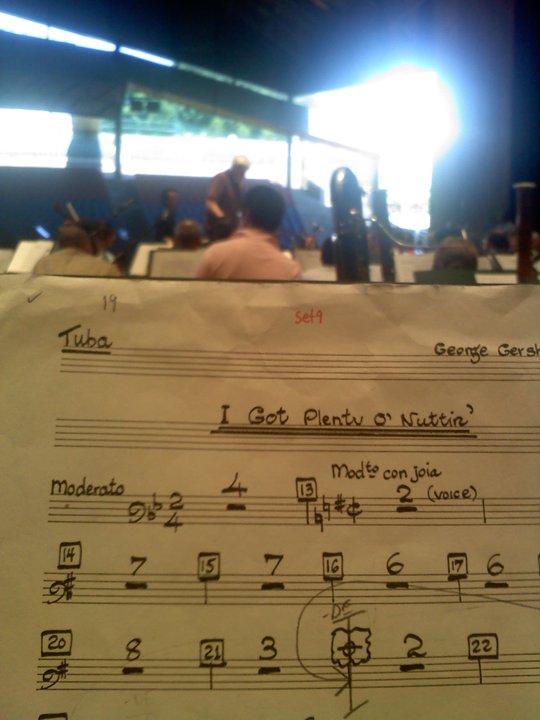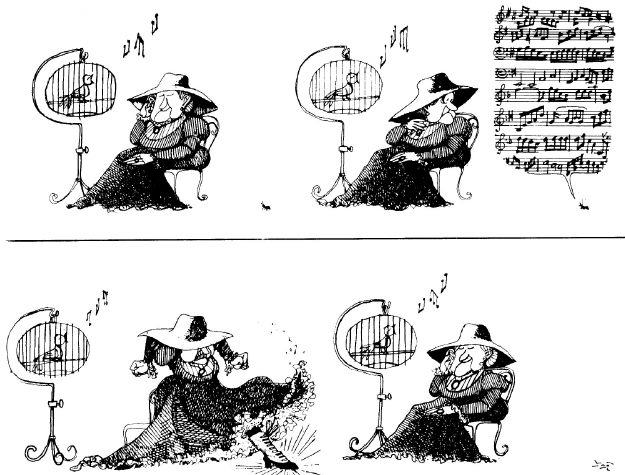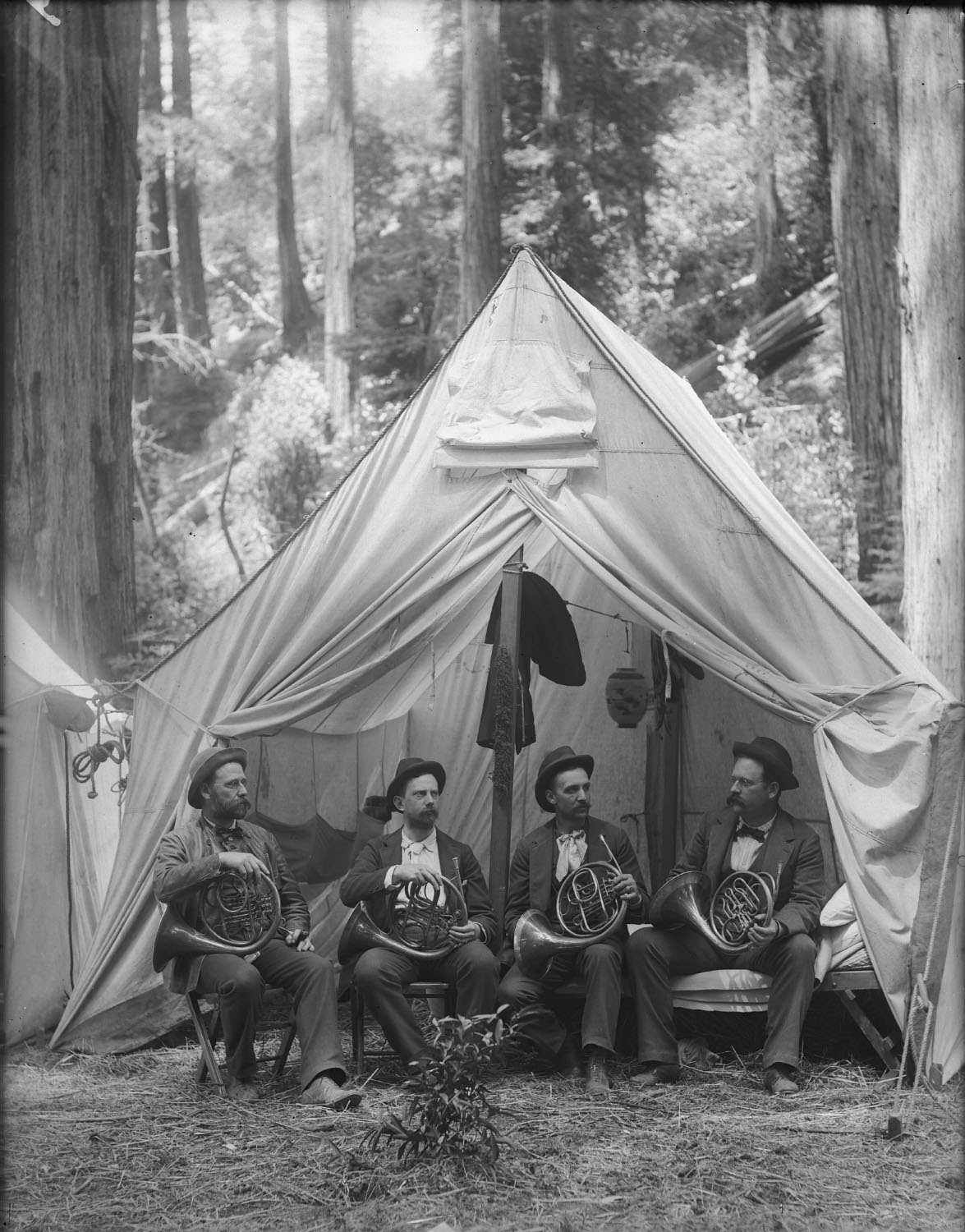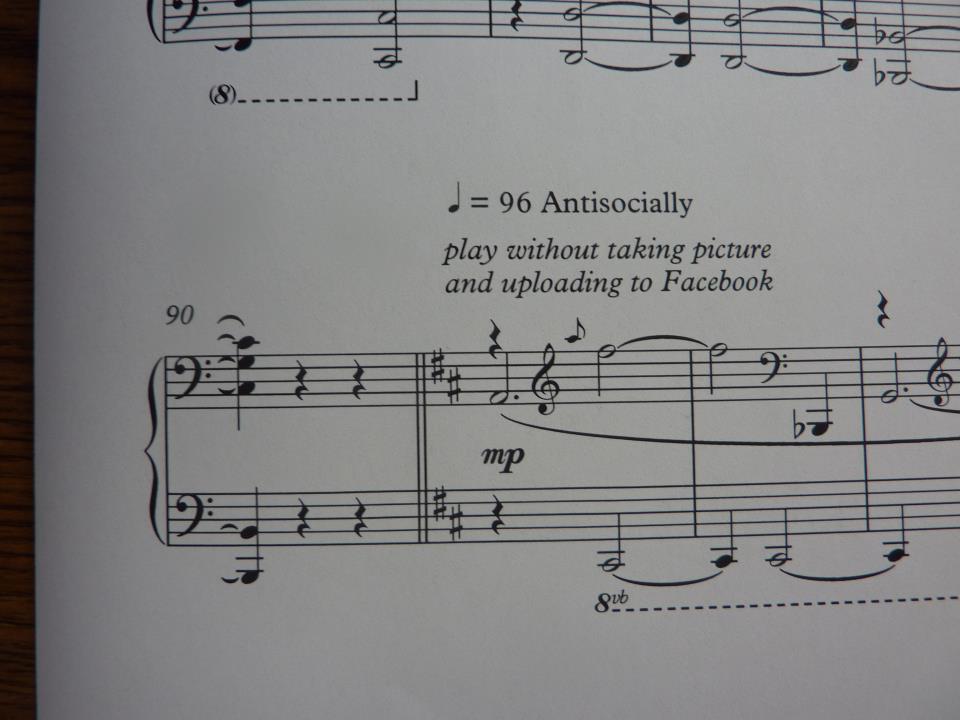Fald ikke i det! 
Den som kun tager spøg for spøg, og alvor kun alvorligt, har forstået begge dele lige dårligt!
Der sidder to musikere på bagsædet i en bil.
Hvem kører bilen?
Det gør politibetjenten.
Når du spiller på dit instrument
Kan kendskab til teksten forbedre fraseringen af en melodi.
Ja ofte er det tilfældet. Bare ikke i denne version af Rondoen fra Mozarts 4. hornkoncert, som vi tilfældigvis har på repertoiret.
Klik hornist, hvis du tør høre den.
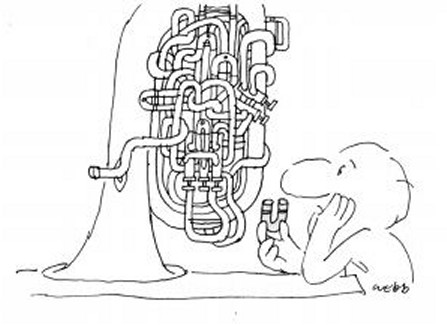

Bare en lille dram – og han synes allerede han spillede anderledes bedre.
To drammer – og hele hans gruppe tænkte at han spillede anderledes.
Tre drammer – og hele orkesteret bemærkede det, men da var han egentlig ligeglad.
Orchestra Personnel Standards
conductor
Leaps tall buildings in a single bound.
Is more powerful than a locomotive.
Is faster than a speeding bullet.
Walks on water.
Gives policy to God.
concertmaster
Leaps short buildings in a single bound.
Is more powerful than a switch engine.
Is just as fast as a speeding bullet.
Walks on water if sea is calm.
Talks with God.
oboist
Leaps short buildings with a running start and favorable winds.
Is almost as powerful as a switch engine.
Is almost as fast as a speeding bullet.
Walks on water in an indoor swimming pool.
Talks with God if special request is approved.
trumpet player
Barely clears a quonset hut.
Loses tug-of-war with locomotive.
Can fire a speeding bullet.
Swims well.
Is occasionally addressed by God.
bassoonist
Makes marks high on wall when trying to clear short buildings.
Is run over by locomotive.
Can sometimes handle a gun without inflicting self-injury.
Dog-paddles.
Talks to animals.
second violinist
Runs into buildings.
Recognizes locomotives two times out of three.
Is not issued any ammunition.
Can stay afloat with a life jacket.
Talks to walls, argues with self.
manager
Falls over doorstep when trying to enter buildings.
Says “Look at the choo-choo.”
Wets self with water pistol.
Plays in mud puddles.
Loses arguments with self.
horn player
Lifts buildings and walks under them.
Kicks locomotives off the tracks.
Catches speeding bullets in teeth and eats them.
Freezes water with a single glance.
Is God.
Gyldne regler for sammenspil
1. Alle burde spille det samme stykke.
2. Stop ved hver gentagelse, og diskuter i detaljer hvilken volte der skal spilles.
3. Se lettere pikeret på en af dine medspillere, hvis du selv rammer en forkert tone.
4. Hold din grebstabel inden for rækkevidde. Du kan sagtens indhente de andre.
5. Stem dit instrument omhyggeligt før du spiller. På den måde kan du med god samvittighed spille falsk en hel aften.
6. Tag dig god tid når du skal finde det næste stykke musik.
7. Den rigtige node på et forkert tidspunkt er en forkert node, og omvendt.
8. Hvis alle undtaget dig har mistet orienteringen, kan du prøve at følge dem der er faret vild.
9. Stræb efter at opnå højst muligt NPS (noder pr. sekund). På den måde vil du opnå beundring hos de inkompetente.
10. Musikalske markeringer for styrke, frasering og løse fortegn bør overses. De er kun skrevet for at udsmykke noden.
11. Sænk hastigheden hvis en passage er lidt vanskelig. Hvis der senere er en let passage, kan du altid sætte hastigheden op, og på den måde går det op til sidst.
12. Hvis du helt og aldeles taber tråden, kan du bare stoppe alle og sige: “Vi stemmer ikke”.
13. Lykkelige er de, som ikke har absolut gehør, – de får ikke så ondt i ørerne.
14. Hvis orkestret går i stå på grund af dig, må du i detaljer forklare hvad der skete. Alle vil være begejstrede for at høre din mening.
15. Der er tale om en ægte fortolkning, når der ikke findes en eneste af de originale noder.
16. Når alle de andre er færdige med at spille et stykke, skal du undlade at spille de noder du måske har til overs.
17. En forkert node spillet med bæven er en forkert node. En forkert node spillet med autoritet er en fortolkning.
Tegn der viser at du har spillet i orkester for længe
Når du hører musik starter du straks med at tælle.
Når alle dine venner er i orkestret.
Når du kan lide din uniform.
Når folk bliver bekymrede hvis de ser dig uden dit instrument.
Når dit instrument har et navn.
Når du ser dit orkester mere end din familie.
Når du ser frem til en vanskelig passage.
Når du synes at øvetiden skulle vare en halv time mere.
Når du kan læse fra bladet.
Når du kan trække i uniformen på mindre end fem minutter.
Når det at tælle takter en din favoritmotion.
Når dit alfabet kun går til G.
Når du forstår musiker-jokes.
A girl went out on a date with a trumpet player, and when she came back her roommate asked, “Well, how was it?
Did his embouchure make him a great kisser?”
“Nah,” the first girl replied. “That dry, tight, tiny little pucker; it was no fun at all.
“The next night she went out with a tuba player, and when she came back her roommate asked, “Well, how was his kissing?””Ugh!” the first girl exclaimed. “Those huge, rubbery, blubbery, slobbering slabs of meat; oh, it was just gross!
“The next night she went out with a French horn player, and when she came back her roommate asked, “Well, how was his kissing?””Well,” the first girl replied, “his kissing was just so-so; but I loved the way he held me!”
Definitions:
detaché: an indication that the trombones are to play with their slides removed.
glissando: a technique adopted by string players for difficult runs.
subito piano: indicates an opportunity for some obscure orchestra player to become a soloist.
senza sordino: a term used to remind the player that he forgot to put his mute on a few measures back.
preparatory beat: a threat made to singers, i.e., sing, or else…
crescendo: a reminder to the performer that he has been playing too loudly.
clef: something to jump from before the viola solo.
string quartet: a good violinist, a bad violinist, an ex-violinist, and someone who hates violinists, all getting together to complain about composers.
transposition: the act of moving the relative pitch of a piece of music that is too low for the basses to a point where it is too high for the sopranos.
vibrato: used by singers to hide the fact that they are on the wrong pitch.
half step: the pace used by a cellist when carrying his instrument.
coloratura soprano: a singer who has great trouble finding the proper note, but who has a wild time hunting for it.
chromatic scale: an instrument for weighing that indicates half-pounds.
bar line: a gathering of people, usually among which may be found a musician or two.
risoluto: indicates to orchestras that they are to stubbornly maintain the correct tempo no matter what the conductor tries to do.
conductor: a musician who is adept at following many people at the same time.
beat: what music students do to each other with their instruments. The down beat is performed on top of the head, while the up beat is struck under the chin.
cadence: when everybody hopes you’re going to stop, but you don’t.
diatonic: low-calorie Schweppes.
virtuoso: a musician with very high morals. (I know one)
music: a complex organizations of sounds that is set down by the composer, incorrectly interpreted by the conductor, who is ignored by the musicians, the result of which is ignored by the audience.
oboe: an ill wind that nobody blows good.
diminished fifth: an empty bottle of Jack Daniels.
perfect fifth: a full bottle of Jack Daniels.
ritard: there’s one in every family.
relative major: an uncle in the Marine Corps.
relative minor: a girlfriend.
big band: when the bar pays enough to bring two banjo players.
pianissimo: “refill this beer bottle”.
treble: women ain’t nothin’ but.
bass: the things you run around in softball.
conductor: the man who punches your ticket to Birmingham.
arpeggio: “Ain’t he that storybook kid with the big nose that grows?”
tempo: good choice for a used car.
A 440: the highway that runs around Nashville.
transpositions: men who wear dresses.
cut time: parole or when everyone else is playing twice as fast as you are.
order of sharps: what a wimp gets at the bar.
passing tone: frequently heard near the baked beans at family barbecues.
middle C: the only fruit drink you can afford when food stamps are low.
perfect pitch: the smooth coating on a freshly paved road.
tuba: a compound word: “Hey, woman! Fetch me another tuba Bryll Cream!”
cadenza: that ugly thing your wife always vacuums dog hair off of when company comes.
whole note: what’s due after failing to pay the mortgage for a year.
clef: what you try never to fall off of.
bass clef: where you wind up if you do fall off.
minor third: your approximate age and grade at the completion of formal schooling.
melodic minor: loretta Lynn’s singing dad.
12-tone scale: the thing the State Police weigh your tractor trailer truck with.
quarter tone: what most standard pickups can haul.
sonata: what you get from a bad cold or hay fever.
clarinet: name used on your second daughter if you’ve already used Betty Jo.
cello: the proper way to answer the phone.
bassoon: typical response when asked what you hope to catch.
french horn: your wife says you smell like a cheap one when you come in at 4 a.m.
cymbal: what they use on deer-crossing signs so you know what to sight-in your pistol with.
bossa nova: the car your foreman drives.
time signature: what you need from your boss if you forget to clock in.
first inversion: grandpa’s battle group at Normandy.
staccato: how you did all the ceilings in your mobile home.
major scale: what you say after chasing wild game up a mountain: “Damn! That was a major scale!”
bach chorale: the place behind the barn where you keep the horses.
audition: the act of putting oneself under extreme duress to satisfy the sadistic intentions of someone who has already made up his mind.
accidentals: wrong notes.
augmented fifth: a 36-ounce bottle.
broken consort: when someone in the ensemble has to leave to go to the bathroom.
cantus firmus: the part you get when you can play only four notes.
chansons de geste: dirty songs.
clausula: Mrs. Santa Claus.
crotchet: a tritone with a bent prong.
ducita: a lot of mallards.
estampie: what they put on letters in Quebec.
hocket: the thing that fits into a crochet to produce a rackett.
interval: how long it takes to find the right note. There are three kinds:
Major interval: a long time.
Minor interval: a few bars.
Inverted interval: when you have to go back a bar and try again.
intonation: singing through one’s nose. Considered highly desirable in the Middle Ages.
isorhythmic motet: when half of the ensemble got a different edition from the other half.
musica ficta: when you lose your place and have to bluff until you find it again.
neums: renaissance midgets.
neumatic melishma: a bronchial disorder caused by hockets.
ordo: the hero in Tolkien’s Lord of the Rings.
sancta: Clausula’s husband.
lasso: the 6th and 5th steps of a descending scale.
di lasso: popular with Italian cowboys.
quaver: beginning viol class.
ritornello: a Verdi opera.
supertonic: Schweppes.
tutti: a lot of sackbuts.
stops: something Bach didn’t have on his organ.
agnus dei: a famous female church composer.
metronome: a city-dwelling dwarf.
allegro: leg fertilizer.
recitative: a disease that Monteverdi had.
transsectional: an alto who moves to the soprano section.

